Inside the troubled mind
of Ronnie O'Sullivan
From Times Online
January 22, 2002
by ALISON KERVIN
TWO weeks ago, on a cold and miserable January day, Ronnie O’Sullivan learnt the frightening truth about life behind bars. The 26-year-old stood before the huge gates guarding Wandsworth Prison, clutching his snooker cue, preparing to play an exhibition match inside. He had no idea that the hours ahead of him would affect him so profoundly.
For O’Sullivan, a trip to a prison was not uncommon. The world snooker champion frequently visits his father, also called Ronnie, who is detained on the Isle of Sheppey in Kent, for murder, and previously visited his mother, Maria, who served 12 months for VAT fraud. But, on this occasion, he would see elements of prison life that he had not encountered on visits to his parents.
O’Sullivan approached the security guards and followed them inside and through a labyrinth of corridors to the main hall, where his exhibition match would be played. He shook hands with inmates and prison officers, then turned to glance behind him as the doors slammed shut, the keys rattled in locks and the gates separating prisoners from the rest of the world closed firmly.
O’Sullivan says he froze. His senses became stronger as the sights, sounds and smells of the outside world became a distant memory.
“Everything changed for me when them doors shut,” O’Sullivan said. “I realised how terrifying it was. I’ve never known nothing like it — suddenly realising how horrible it is to be in prison. I’ve been on plenty of visits to Dad, but visiting is different from going right inside. I was looking around and thinking: ten or 11 years in a place like this — how do they do it? How does Dad do it? For me, personally, I would just be wanting to get out. Everyone I met in there was lovely — really decent blokes — but I just wanted to be back on the other side of the wall.
“I think differently about my Dad since that visit. I realise how strong he is to cope without complaining. In the 10½ years that he’s been in jail, he hasn’t once moaned — he’s accepted his sentence. He knows what he did wrong and he’ll serve his time.
“I now know how lonely he must be and I’m more careful when I talk to him. I think of the days in the past when he’s rung and I’ve thought, ‘I don’t feel like talking today’, so he said he’ll call back. Now I make sure I talk to him. Whatever mood I’m in doesn’t matter. I’ve got to talk to him because he’s got nothing else in there — his family are all he’s got.”
O’Sullivan is the dark and brooding snooker maestro with attitude. Last year he won the World Championship to a chorus of approval from fellow players who described him as one of the most talented players ever to grace the game. He is nicknamed the Mozart of the table for his effortless, natural gift. He is wealthy beyond his dreams, drives sports cars and owns 20 properties. He is fit, good-looking and enjoys a happy relationship with his girlfriend. He has made a phenomenal success out of his huge talent.
But, over the years, he has found himself crushed by depression, seeking solace in Prozac. He has been violent and smoked drugs at snooker events and, last year, he admitted himself into The Priory clinic for treatment. His depression constantly occupies a corner of his mind, feeding off his insecurities and frustrations and enveloping him when he least expects it.
The O’Sullivan family story begins in the East End of London where Mickey, his grandfather, was a boxer, as were Mickey’s brothers, Danny and Dickie. The trio were known as the Fighting O’Sullivans and Danny became British bantamweight champion.
“People like to make it sound very rough, but it wasn’t,” O’Sullivan said. “It was home. They are my family — it wasn’t like some gangster movie.”
O’Sullivan grew up a happy child, soon devoting much of his time to snooker, which he discovered by accident when he was 4 and playing at his cousin’s house. He began to play the game regularly, always taking it seriously. He would watch and learn, making mental notes as other, more experienced players took the table.
AT THE time, his father was running a chain of shops that have been described as selling pornographic material, but which O’Sullivan calls “just normal bookshops with a quite colourful section”. When he was 16, O’Sullivan’s world was blown apart when his father was jailed for murder after stabbing a man in a nightclub brawl. O’Sullivan’s mother took over the running of the business and three years later, in 1995, she was jailed for 12 months for fraud.
“It was very hard, sure, but life is hard. I became depressed and it was a very difficult period, but you can learn from the bad things what happened to you, as well as the good. My Dad always says that he wants me to learn the pitfalls via him, instead of having to go out and find out myself. I know it sounds odd, but what happened to Dad has taught me a hell of a lot and I’m not going to go the same way.
“Dad was a talented footballer when he was young — someone who could have made the grade but didn’t. He had all the ability but didn’t have dedication. I now know that if you want to get to the top, you have to sacrifice a lot. I know my Dad’s in prison, but he’s still a good person. He regrets that it happened, he realises there was a victim and he’s remorseful about it. He didn’t want anyone to die that night.”
Snooker was, in some ways, O’Sullivan’s saving grace — it was a game to which he took naturally and loved in a way he finds difficult to articulate. “For some reason, the game just got me,” he said. “When I was playing, I shut out everything else — nothing came into my mind except snooker. I could escape from everything what was happening. All the bad stuff wasn’t happening while I was at the table.”
O’Sullivan was 15 when he first made the snooker world sit up — he became the youngest player to compile a recognised maximum break during the English Amateur Championships. He turned professional in 1992, the year that his father was jailed, and won 38 successive matches. In 1997, he recorded the fastest 147 in history, during the Embassy World Championship. The break was worth £165,000, meaning that he earned £515.62 a second.
But there were bad times. In 1996, at the World Championship, he butted a press officer and was fined £20,000. Then, at the 1998 Benson and Hedges Masters, he tested positive for cannabis, forfeited his title and was fined £61,000.
“I know I’m far from perfect, but I’m working hard at getting myself right, and I will. I’ve watched the way Steve Davis and Stephen Hendry conduct themselves, on and off the table. They are quieter and more professional about the game. If you want to be the best, you have to learn from the best, so I’ve tried to moderate myself. Over the last year and a half, I’ve trained myself. I’ve realised that in order to get the best out of myself, I’ve got to be like them and live my life like they do. I’ve got to be clean. You can’t abuse yourself and be the best.
“I also want to build a future and you can’t do that if you abuse yourself. When I was 20, I bought my first house and rented it out to make money. I’ve got about 20 houses now — they’re all rented except for the one I live in, the one that Mum lives in and the Old Compton Street place that I’m going to turn into an underwear shop.”
On the snooker table, O’Sullivan’s next challenge is the Benson and Hedges Masters tournament, which starts on February 3. “This is the big tournament for me,” he said. “I love Wembley and love doing well there. I just have to hope that everything comes right for me. Snooker can be so frustrating — it’s like golf in many ways. They’re both still ball sports and they’re both about timing and tempo. Sighting the ball and seeing the angles is what makes you good. If you ain’t seeing the angles, you feel like a beginner — that’s when it gets tough.”
O’Sullivan is a man whose singular determination to succeed has taken him to the top of his sport. He has coped with pressures too difficult to imagine but remains bright, upbeat and confident about the future, with one big desire. He hopes, desperately, that he will still be playing when his father comes out of prison.
“I’m not naive enough to think I’ll still be winning tournaments when I’m 34 — look at the average age of snooker players, they’re about 25 or 26. But I hope I’m still playing at some level. You never know, if I keep myself fit then, please God, when I’m 34, I can still play right at the top and my Dad can come and see me.”
29. 4. Robert
Návštěvnost stránek
ANTEE s.r.o. - Tvorba webových stránek, Redakční systém IPO

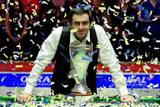
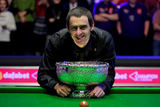
![Welsh Open[2].jpg](image.php?nid=1380&oid=3689245&width=160&height=174)
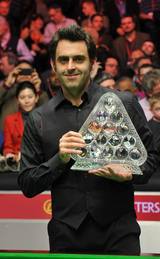

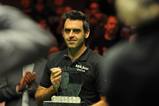
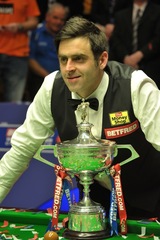
![Ronnie_OSullivan_Snooker_Champion_PTC7_2011[2].jpg](image.php?nid=1380&oid=2439625&width=160&height=151)
![topimage[2].jpg](image.php?nid=1380&oid=2498497&width=160&height=141)
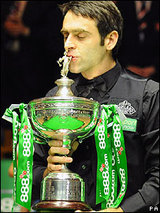
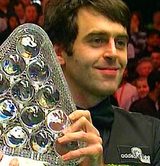
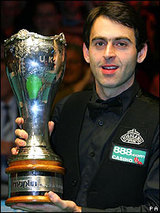

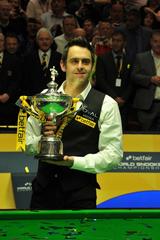

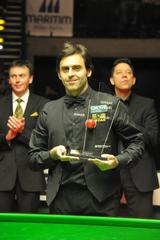

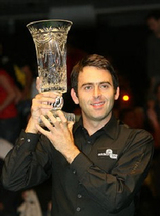
![08%20pls%20ronnie%20trophy[3].jpg](image.php?nid=1380&oid=1189442&width=160&height=198)
